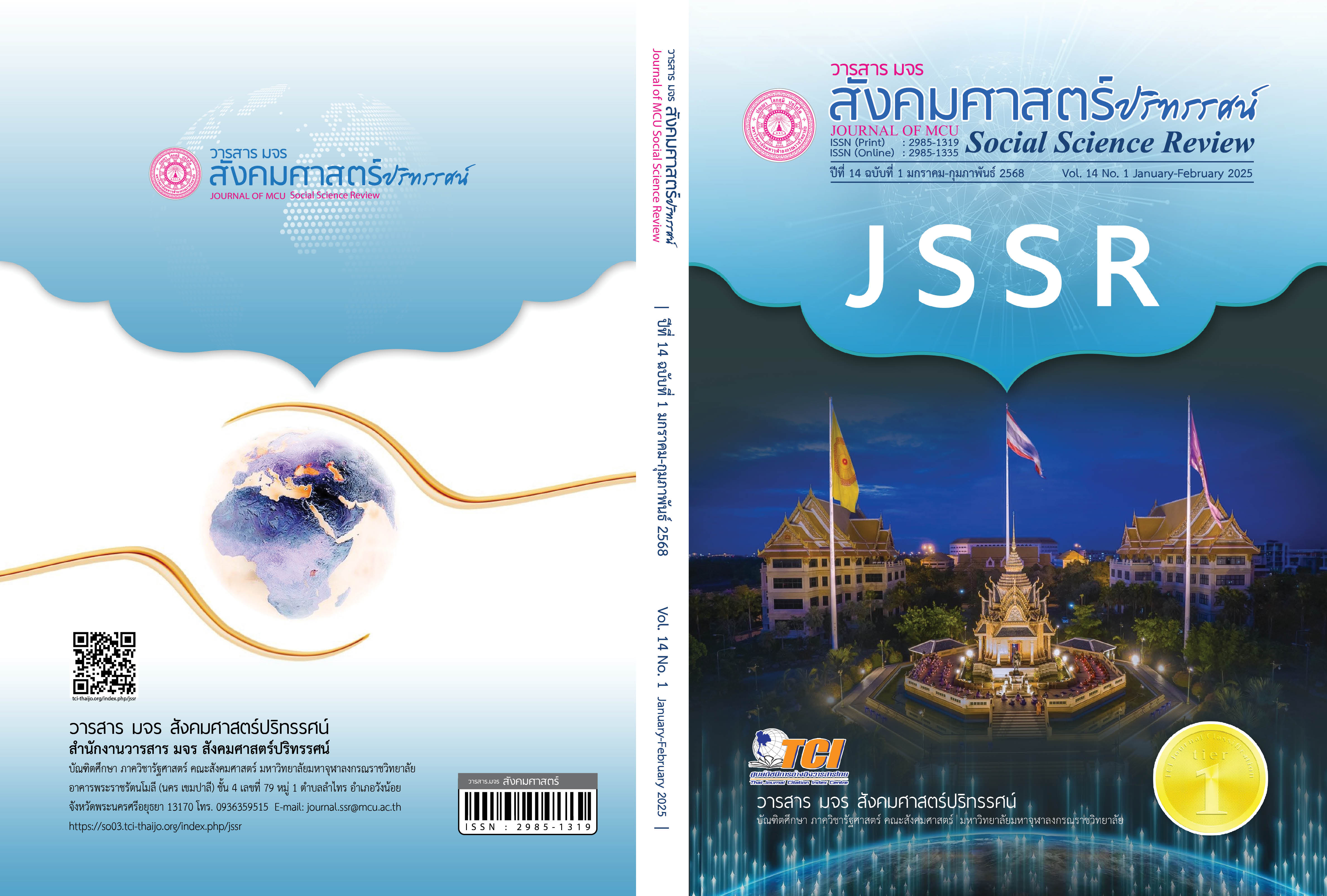การวิเคราะห์และสำรวจมุมมองของผู้มีส่วนได้ส่วนเสียในการออกแบบ ชุดกิจกรรมการเรียนรู้ตามทฤษฎีการเรียนรู้จากประสบการณ์ เรื่องความน่าจะเป็น เพื่อส่งเสริมความฉลาดรู้ด้านคณิตศาสตร์ สำหรับนักเรียนชั้นมัธยมศึกษาปีที่ 3
คำสำคัญ:
ชุดกิจกรรมการเรียนรู้, ความน่าจะเป็น, ความฉลาดรู้ด้านคณิตศาสตร์, ทฤษฎีการเรียนรู้จากประสบการณ์บทคัดย่อ
บทความวิจัยนี้มีวัตถุประสงค์ 1. วิเคราะห์และสำรวจมุมมองของผู้มีส่วนได้ส่วนเสีย และ 2. ศึกษาแนวทางการออกแบบชุดกิจกรรมการเรียนรู้ตามทฤษฎีการเรียนรู้จากประสบการณ์ เรื่องความน่าจะเป็น เพื่อส่งเสริมความฉลาดรู้ด้านคณิตศาสตร์สำหรับนักเรียนชั้นมัธยมศึกษาปีที่ 3 ใช้ระเบียบวิธีวิจัยเชิงคุณภาพ ผู้ให้ข้อมูลสำคัญประกอบด้วย ครู นักเรียน ผู้อำนวยการโรงเรียน ผู้ปกครอง และนักออกแบบชุดกิจกรรมการเรียนรู้ เครื่องมือที่ใช้ในการเก็บรวบรวมข้อมูล ประกอบด้วย แบบสัมภาษณ์กึ่งโครงสร้าง แบบผู้ใช้จำลอง แบบสังเคราะห์ข้อมูล และแบบบันทึกผลลัพธ์ของหลักการออกแบบ วิเคราะห์ข้อมูลโดยใช้วิธีการวิเคราะห์เนื้อหา
ผลการวิจัยพบว่า 1. ความต้องการของผู้มีส่วนได้ส่วนเสีย ประกอบด้วย 1. กลุ่มครูต้องการชุดกิจกรรมที่ใช้งานง่าย พร้อมคำอธิบายชัดเจน และสามารถพิมพ์ซ้ำได้ เป็นกิจกรรมที่นักเรียนมีส่วนร่วม และแบบฝึกหัดที่ครอบคลุมทุกกลุ่มนักเรียน ตั้งแต่นักเรียนที่มีพื้นฐานอ่อนจนถึงนักเรียนที่มีพื้นฐานดี 2. กลุ่มนักเรียนต้องการต้องการกิจกรรมทดลองหรือเกมที่ช่วยเชื่อมโยงเนื้อหากับชีวิตจริงและแบบฝึกหัดที่ง่าย 3. กลุ่มผู้อำนวยการโรงเรียนต้องการชุดกิจกรรมที่เน้นการเรียนรู้จากประสบการณ์ และเชื่อมโยงเนื้อหากับชีวิตจริง แบบฝึกหัดหรือกิจกรรมที่ช่วยพัฒนาทักษะการคิดวิเคราะห์และเพิ่มคะแนนสอบ สื่อที่ต้นทุนต่ำ ครูสามารถใช้งานได้ง่ายและนักเรียนสามารถเรียนรู้ได้ทันทีในห้องเรียน และ 4. กลุ่มผู้ปกครองต้องการกิจกรรมที่เชื่อมโยงกับชีวิตจริง สื่อการสอนที่ช่วยกระตุ้นความสนใจของนักเรียน 2. แนวทางการออกแบบชุดกิจกรรมการเรียนรู้ตามทฤษฎีการเรียนรู้จากประสบการณ์ใช้หลักการออกแบบที่ประกอบด้วย 1. คุณลักษณะตัวแทรกแซง ได้แก่ จุดเน้นเชิงสาระ และจุดเน้นเชิงกระบวนการ 2. ตัวแปรเหตุละ 3. ตัวแปรผลลัพธ์ อช่วยในการออกแบบชุดกิจกรรมการเรียนรู้ที่สอดคล้องกับความต้องการของผู้มีส่วนได้ส่วนเสีย ทั้งในด้านเนื้อหา กระบวนการ และผลลัพธ์ ที่ตอบสนองต่อปัญหาและความต้องการของผู้มีส่วนได้ส่วนเสียได้อย่างมีประสิทธิภาพ
เอกสารอ้างอิง
กิตติพล สุวรรณไตรย์ และคณะ. (2567). การออกแบบและพัฒนาชุดกิจกรรมการเรียนรู้จากประสบการณ์เพื่อส่งเสริมความฉลาดรู้คณิตศาสตร์สำหรับนักเรียนระดับชั้นประถมศึกษาตอนต้น. วารสารมนุษยศาสตร์และสังคมศาสตร์ มหาวิทยาลัยราชภัฏสุรินทร์, 26(2), 148-153.
นิตยา ดอบุตร และคณะ.(2567). การพัฒนากิจกรรมการเรียนรู้วิชาคณิตศาสตร์โดยใช้รูปแบบวัฏจักรการเรียนรู้ 7 ขั้น (7E) ร่วมกับแนวคิดเมตาคอกนิชัน เรื่องความน่าจะเป็น สำหรับนักเรียนชั้นมัธยมศึกษาปีที่ 4. วารสารวิชาการหลักสูตรและการสอน มหาวิทยาลัยราชภัฏสกลนคร, 16(47), 77-89.
สถาบันทดสอบทางการศึกษาแห่งชาติ. (2567). ผลการสอบ O-NET ปีการศึกษา 2566. สืบค้น 28 มิถุนายน 2567, จาก https://www.niets.or.th/th/content/view/26039
อภิสิทธิ์ ไล่สัตรูไกล. (2557). SERVICE DESIGN WORKBOOK คู่มือการออกแบบบริการ. กรุงเทพฯ: ศูนย์สร้างสรรค์งานออกแบบ.
PISA Thailand. (2020). กรอบการประเมินความฉลาดรู้ด้านคณิตศาสตร์. สืบค้น 6 กรกฎาคม 2567, จาก https://pisathailand.ipst.ac.th/aboutpisa/mathematical_literacy _ framework/
PISA Thailand. (2022). ผลการประเมิน PISA 2022. สืบค้น 29 มิถุนายน 2567, จากhttps://pisathailand.ipst.ac.th/news-21/
Freeman, R. E. et al. (2014). Stakeholder theory: Concepts and applications. Cambridge University Press.
Johnson, K. E. & Golombek, P. R. (2018). Mindful L2 teacher education: A sociocultural perspective on cultivating teachers’ professional development. Oxfordshire: Routledge.
Kolb, D. A. (1984). Experiential learning: Experience as the source of learning and development. Englewood Cliffs, NJ: Prentice Hall.
_____. (2015). Experiential learning: Experience as the source of learning and development (2nd ed.). London: Pearson Education.
Maslow, A. H. (1943). A theory of human motivation. Psychological Review. Retrieved January 5, 2025, from https://doi.org/10.1037/h0054346
Moreno, R. (2003). Nine ways to reduce cognitive load in multimedia learning. Educational psychologist, 38(1), 43-52.
McKenney, S. & Reeves, T. (2018). Conducting educational design research. Routledge.
Organization for Economic Co-operation and Development. (2018). PISA 2018 assessment and analytical framework. OECD Publishing. Retrieved August 18, 2024, from https://pisathailand.ipst.ac.th/about-pisa/mathematical_literacy_framework/
Organization for Economic Co-operation and Development. (2022). PISA 2022 results: What students know and can do. OECD Publishing. Retrieved August 20, 2024, from https://pisathailand.ipst.ac.th/news-21/
Schunk, D. H. & Zimmerman, B. J. (2007). Influencing children's self-efficacy and self-regulation of reading and writing through modeling. Reading & Writing Quarterly, 23(1), 7-25.
van den Akker, J. (1999), Principles and methods of development research. In J. van den Akker et al. (Eds) Design approaches and tools in education and training (op. 1-14). Dordrecht, the Netherlands: Kluwer Academic Publishers.
Zhou, M. & Brown, D. (2015). Educational learning theories. Education Open Textbooks. University of Idaho.
ดาวน์โหลด
เผยแพร่แล้ว
รูปแบบการอ้างอิง
ฉบับ
ประเภทบทความ
สัญญาอนุญาต
ลิขสิทธิ์ (c) 2025 วารสาร มจร สังคมศาสตร์ปริทรรศน์

อนุญาตภายใต้เงื่อนไข Creative Commons Attribution-NonCommercial-NoDerivatives 4.0 International License.
เพื่อให้เป็นไปตามกฎหมายลิขสิทธิ์ ผู้นิพนธ์ทุกท่านต้องลงลายมือชื่อในแบบฟอร์มใบมอบลิขสิทธิ์บทความให้แก่วารสารฯ พร้อมกับบทความต้นฉบับที่ได้แก้ไขครั้งสุดท้าย นอกจากนี้ ผู้นิพนธ์ทุกท่านต้องยืนยันว่าบทความต้นฉบับที่ส่งมาตีพิมพ์นั้น ได้ส่งมาตีพิมพ์เฉพาะในวารสาร มจร สังคมศาสตร์ปริทรรศน์ เพียงแห่งเดียวเท่านั้น หากมีการใช้ภาพหรือตารางหรือเนื้อหาอื่นๆ ของผู้นิพนธ์อื่นที่ปรากฏในสิ่งตีพิมพ์อื่นมาแล้ว ผู้นิพนธ์ต้องขออนุญาตเจ้าของลิขสิทธิ์ก่อน พร้อมทั้งแสดงหนังสือที่ได้รับการยินยอมต่อบรรณาธิการ ก่อนที่บทความจะได้รับการตีพิมพ์ หากไม่เป็นไปตามข้อกำหนดเบื้องต้น ทางวารสารจะถอดบทความของท่านออกโดยไม่มีข้อยกเว้นใดๆ ทั้งสิ้น





